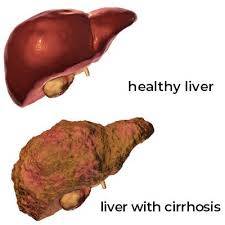Cirrhosis of the liver is a serious condition that can be caused by various factors. Here are 20 causes, signs and symptoms, effects, and solutions related to cirrhosis:
**Causes:**
1. Chronic alcohol abuse.
2. Chronic viral hepatitis (B, C, and D).
3. Nonalcoholic fatty liver disease (NAFLD).
4. Nonalcoholic steatohepatitis (NASH).
5. Hemochromatosis (iron buildup in the body).
6. Wilson's disease (copper buildup).
7. Autoimmune hepatitis.
8. Biliary atresia (blocked bile ducts in infants).
9. Cystic fibrosis-related liver disease.
10. Genetic digestive disorders.
11. Liver disease due to long-term exposure to toxins.
12. Glycogen storage disease.
13. Alpha-1 antitrypsin deficiency.
14. Schistosomiasis (parasitic infection).
15. Medications, such as methotrexate and isoniazid.
16. Heart disease causing congestive hepatopathy.
17. Celiac disease.
18. Liver disease due to cysts (e.g., polycystic liver disease).
19. Repeated bouts of heart failure with liver congestion.
20. Unknown causes (cryptogenic cirrhosis).
**Signs and Symptoms:**
1. Fatigue and weakness.
2. Jaundice (yellowing of the skin and eyes).
3. Loss of appetite and weight loss.
4. Swelling in the abdomen and legs (ascites).
5. Itchy skin (pruritus).
6. Dark urine.
7. Pale-colored stools.
8. Easy bruising and bleeding.
9. Enlarged spleen (splenomegaly).
10. Confusion and cognitive changes (hepatic encephalopathy).
11. Spider-like blood vessels on the skin (spider angiomas).
12. Fluid retention in the ankles.
13. Nausea and vomiting.
14. Abdominal pain and discomfort.
15. Muscle cramps.
16. Increased sensitivity to medications and toxins.
17. Clubbing of the fingers.
18. Testicular atrophy in men.
19. Hormonal changes, such as gynecomastia in men.
20. Osteoporosis and bone fractures.
**Effects:**
1. Liver scarring (fibrosis) leading to impaired liver function.
2. Portal hypertension (high blood pressure in the liver's blood vessels).
3. Increased risk of liver cancer (hepatocellular carcinoma).
4. Hepatic encephalopathy, which can lead to confusion and coma.
5. Kidney problems (hepatorenal syndrome).
6. Malnutrition and weight loss.
7. Esophageal varices (swollen blood vessels in the esophagus).
8. Ascites, which can lead to abdominal discomfort and infection.
9. Increased risk of infections due to immune system impairment.
10. Coagulation problems, leading to bleeding disorders.
11. Heart problems due to circulatory changes.
12. Difficulty metabolizing medications and toxins.
13. Bone health issues due to nutrient absorption problems.
14. Changes in sexual characteristics and function.
15. Impaired blood sugar regulation.
16. Skin problems due to impaired metabolism.
17. Increased risk of osteoporosis and fractures.
18. Psychological and cognitive issues.
19. Loss of quality of life and disability.
20. Life-threatening complications in advanced stages.
**Solutions:**
1. Treating the underlying cause (e.g., alcohol cessation, treating viral hepatitis).
2. Lifestyle changes, including a healthy diet and exercise.
3. Medications to manage symptoms and complications.
4. Liver transplantation in severe cases.
5. Managing complications like ascites, hepatic encephalopathy, and varices.
6. Regular medical monitoring and follow-up.
7. Avoiding alcohol and certain medications.
8. Vaccination against hepatitis A and B.
9. Weight loss and management for NAFLD/NASH.
10. Treating underlying conditions like hemochromatosis or Wilson's disease.
11. Dietary changes to reduce sodium and manage fluid retention.
12. Treating associated conditions like diabetes and high blood pressure.
13. Antiviral therapy for hepatitis-related cirrhosis.
14. Regular screening for liver cancer.
15. Supportive care and counseling.
16. Avoiding exposure to toxins and chemicals.
17. Quitting smoking.
18. Managing bone health and nutrition.
19. Support groups and psychological counseling.
20. Educating patients and their families about the disease.
Cirrhosis is a serious condition, and early diagnosis and management are crucial. If you suspect you have cirrhosis or are at risk, consult a healthcare professional for evaluation and guidance.



No comments yet
Be the first to share your thoughts!